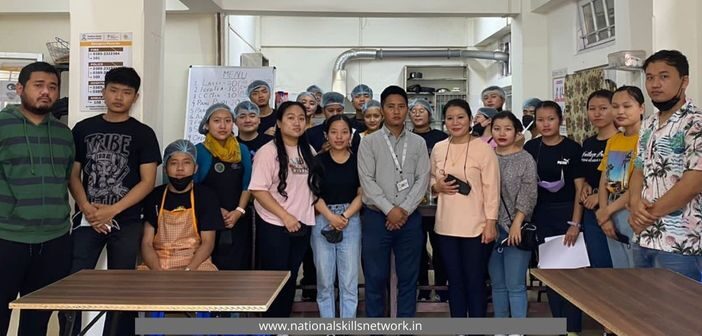
The North-Eastern region in India is fast emerging as a leading destination for higher education in the country. Several universities coming up in the region are offering inclusive and equitable higher education and preparing youth to not only cater to the needs of the country but also compete globally.
One such university offering skill-based higher education, work-integrated learning and industry-relevant courses in the North-East region of India is Medhavi Skills University in Sikkim.
To learn more about the developments in the field of higher education in the North-Eastern region, setting up of Medhavi Skills University, and taking steps towards implementing NEP 2020, among others, we conversed with Mr. Pravesh Dudani, Founder and Chancellor, Medhavi Skills University (Sikkim).
Medhavi Skills University (MSU) is a government notified and UGC, DGT & NSDC recognised Skills University of North East India, which has been established with the passage of the Medhavi Skills University Act 2021 by the Sikkim State Government. MSU is promoted by a group of IIT Alumni with a vision to bring convergence of the skilling ecosystem with the higher education tracks by promoting in-demand skill integrated higher education linked to employability and career progression. MSU is the first of its kind pioneering university model where corporates/ industries are the stakeholders and influencers in curriculum design, programme delivery and providing practical skills training via on-the-job training opportunities.
Below are a few excerpts from our conversation, you can watch the complete conversation on our YouTube channel.
Q: What is your vision behind setting up Medhavi Skills University? What are some of the issues you are trying to address through the programmes being offered by Medhavi Skills University?
A: The critical issue in the current skills ecosystem is the low social value of the skills certificate. Our Indian society has a decades-old mindset that a degree holder, a graduate, is a “pada likha” (well qualified) person and the society attaches an inherent value to the graduate qualification. The short-term skills certification has struggled to build that level of credibility in the eyes of the consumer (students/parents) as well as in the Industries.
Furthermore, the Industries still value an entry-level resource with an ITI certification / Ploy-technique Diploma qualification much more than a short-term skilled candidate, even if the latter candidate possesses better hands-on skills. Also, the formally qualified candidates get better remuneration and appraisal prospects in the long term.
As a 10-year-old Skilling and Education organisation, we were doing about 20,000+ short-term skilling in a year and placing about 60-70% of such candidates in Industries. Most of such students were school dropouts or, at maximum 12th Pass. We saw that more than 50% of the skill-trained candidates returned to their home location within six months of joining the industries. We did a survey and found out that the most significant reason for candidates returning back was their want to complete their post-school education (ITI / Diploma or graduation) to increase their social status. Youth from tier two and three towns don’t want to be left behind and are aspirational.

We saw an opportunity in this, a clear need for a platform which could enable us to design and offer demand-driven formal qualifications (Degree/ Diploma/ Certifications) with embedded skills and holistic education, which can empower youth with jobs with assured career progression. Hence, the genesis of the Medhavi Skills University.
The biggest issue we are trying to solve through MSU is taking affordable higher education to the masses. Through its work integrated the “Learn while Earn” model, candidates from disadvantaged backgrounds can afford higher education who otherwise would have been at risk of a dropout.
Our vision is to empower the youth of India with Skill-integrated Higher Education linked to Employability and Entrepreneurship, leading to a dignified career and life.
Our approach is that any short-term or long-term courses we would develop and offer should be able to provide Industry relevant skills and knowledge leading to higher employability linking to assured employment through OJT embedded Degree / Diploma qualifications.
Q: With NEP 2020 proposing many changes in higher education, how do you plan to implement industry-integrated courses by partnering with various industries?
A: In line with the mandate of implementing the provisions of NEP 2020, all the higher education regularity bodies, including UGC, AICTE, and NCVET, have rolled out new guidelines which form the underlying principles of industry-integrated learning and education. For Example, the AEDP (Apprenticeship embedded Degree programmes) guidelines talk about embedding formal apprenticeships as an integral component of the curriculum with credit weightage. Universities can sign MoUs with Industries to provide on-the-job training (OJT) with defined learning and skilling outcomes for candidates. As per NEP 2020 and the proposed National Credit Framework, the hours spent on on-the-job training can lead to the accumulation of University credits.
At MSU, we are partnering with industries across various sectors to launch fully work-integrated courses, Degree / Diploma courses where about 50% of the credits are assigned towards OJT and are earned on-site working as a trainee while working with practical machines and real work environments where candidates also contribute to the production or service outputs as well as earn handsome stipends.
Q: What are some of the popular courses at Medhavi Skills University and what has been the response of the parents and students?
A: Some of our popular courses are B.Sc in Hospitality in Hotel Management, which is an apprenticeship-embedded Degree Programme launched in partnership with the IHG group of hotels (Crown Plaza and Holiday Inn 5-star hotel chain). The candidate joins the Industry from day 1 of the University course. Practical training is taken care of by the IHG corporate trainers and supervisors, and the fundamental and theoretical training is conducted by the University faculties in a blended learning approach. The response of the students and parents is excellent as the students get three years of work experience along with a UGC recognised Degree and a confirmed employment post completion of the programme. The challenge for us is to promote the programme to the masses so that more and more students get to benefit from this arrangement with the industry.
Another popular course is the Flexi ITI courses under the Flexi MoU scheme of DGT, under which we are placing candidates as trainees in reputed manufacturing Industries. Candidates work in a practical production environment and get monthly stipends. University takes care of the theoretical subjects in a blended learning approach.
Q: How does a skill university distinguish itself from other training organizations and academic institutions that offer skill-based courses?
A: As per our mission, we focus on creating courses / Qualification Packs/assessment standards which are level 6 and above as per NSQF and target particular geography or demography along with niche areas and industries. For example, we recently partnered with a Music Production house to create high-quality skill-based courses in Audiography and Sound Engineering, which can only be done through industry collaborations. Our goal is to develop such standards, and the training partners can benefit from such industry-vetted curriculum and content. In addition, we are embedding such Qualification Packs, and Occupational Standards as embedded components of our Degree/Diploma courses to make them outcome-oriented and competency benchmarked, which differentiates us from a traditional University approach.
Q: What is your plan for hiring the faculty at the university level? How do you address the challenge of attracting faculty who have prior industry experience?
A: We are hiring Master Skill Instructors to take care of the skills component of the curriculum and full-time adjunct faculties for the academic and domain knowledge delivery part of the curriculum as per the UGC guidelines. For the Industry oriented courses, trainers must have the relevant industry experience to qualify as Master Skill Instructors.













